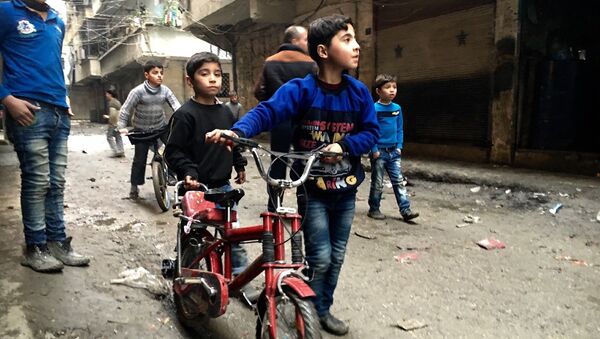According to the latest data collated by humanitarian organizations, nearly 40% of Syria's refugees are under the age of 12, and many of them suffer from Post Traumatic Stress Disorder (PTSD).
Children are exposed to overwhelming suffering as they regularly see their family members tortured and killed by terrorists.
"It’s not just their childhood they’re losing, it’s the loss of family, it’s the loss of education, it’s the loss of their friends. Everything they’ve known has been lost," Dr. Pam Ramsden, a researcher at the Faculty of Social Sciences of the University of Bradford told Radio Sputnik.
She further explained that during a traumatic experience, the human brain releases certain chemicals which help a person cope with stress. However, while it helps escape a short term trauma, a constant release of these chemicals during a long-term traumatic experience prevents a child from developing normally neurologically.
"In any kind of conflict, when people are under stress, some people say 'right, I’m going to pull it together, I’m going to get stronger because of this'; but then there’s another group of people who weaken as a result of that," Doctor Ramsden added.
She also said that in many cases it is difficult to determine which way a child affected in this manner is going to develop until he or she becomes a teenager. At the same time, traumatized children often exhibit symptoms normally associated with naughty children, as they become angry, defiant and refuse to obey authority, which would likely cause problems during resettlement.
"They will have difficulty with attaching, with friends and family members or foster care, or whoever is taking care of them, they will have a difficult time," Ramsden said. "Children who have attachments will be better off because damage can be overcome if people are helping them out."
Also, according to Doctor Ramsden, while the governments tasked with resettling the refugee children are probably aware of the issue, they apparently don’t know what to do.


